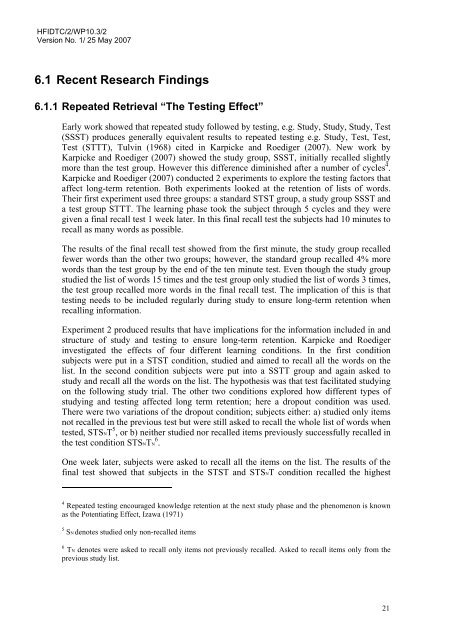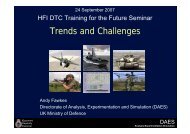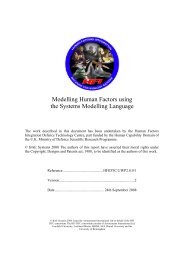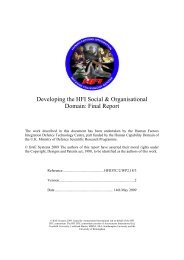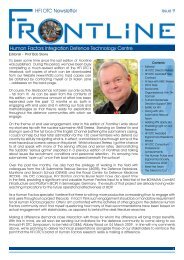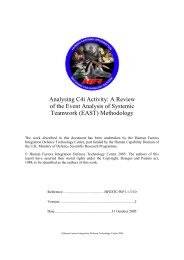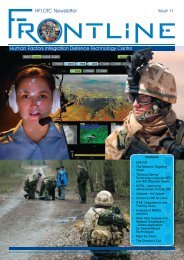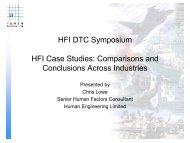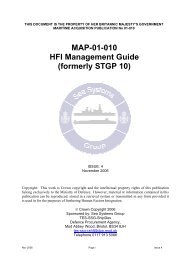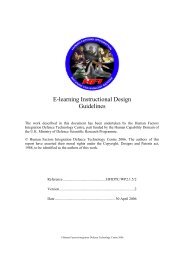Literature Review on Skill Fade - Human Factors Integration ...
Literature Review on Skill Fade - Human Factors Integration ...
Literature Review on Skill Fade - Human Factors Integration ...
You also want an ePaper? Increase the reach of your titles
YUMPU automatically turns print PDFs into web optimized ePapers that Google loves.
HFIDTC/2/WP10.3/2<br />
Versi<strong>on</strong> No. 1/ 25 May 2007<br />
6.1 Recent Research Findings<br />
6.1.1 Repeated Retrieval “The Testing Effect”<br />
Early work showed that repeated study followed by testing, e.g. Study, Study, Study, Test<br />
(SSST) produces generally equivalent results to repeated testing e.g. Study, Test, Test,<br />
Test (STTT), Tulvin (1968) cited in Karpicke and Roediger (2007). New work by<br />
Karpicke and Roediger (2007) showed the study group, SSST, initially recalled slightly<br />
more than the test group. However this difference diminished after a number of cycles 4 .<br />
Karpicke and Roediger (2007) c<strong>on</strong>ducted 2 experiments to explore the testing factors that<br />
affect l<strong>on</strong>g-term retenti<strong>on</strong>. Both experiments looked at the retenti<strong>on</strong> of lists of words.<br />
Their first experiment used three groups: a standard STST group, a study group SSST and<br />
a test group STTT. The learning phase took the subject through 5 cycles and they were<br />
given a final recall test 1 week later. In this final recall test the subjects had 10 minutes to<br />
recall as many words as possible.<br />
The results of the final recall test showed from the first minute, the study group recalled<br />
fewer words than the other two groups; however, the standard group recalled 4% more<br />
words than the test group by the end of the ten minute test. Even though the study group<br />
studied the list of words 15 times and the test group <strong>on</strong>ly studied the list of words 3 times,<br />
the test group recalled more words in the final recall test. The implicati<strong>on</strong> of this is that<br />
testing needs to be included regularly during study to ensure l<strong>on</strong>g-term retenti<strong>on</strong> when<br />
recalling informati<strong>on</strong>.<br />
Experiment 2 produced results that have implicati<strong>on</strong>s for the informati<strong>on</strong> included in and<br />
structure of study and testing to ensure l<strong>on</strong>g-term retenti<strong>on</strong>. Karpicke and Roediger<br />
investigated the effects of four different learning c<strong>on</strong>diti<strong>on</strong>s. In the first c<strong>on</strong>diti<strong>on</strong><br />
subjects were put in a STST c<strong>on</strong>diti<strong>on</strong>, studied and aimed to recall all the words <strong>on</strong> the<br />
list. In the sec<strong>on</strong>d c<strong>on</strong>diti<strong>on</strong> subjects were put into a SSTT group and again asked to<br />
study and recall all the words <strong>on</strong> the list. The hypothesis was that test facilitated studying<br />
<strong>on</strong> the following study trial. The other two c<strong>on</strong>diti<strong>on</strong>s explored how different types of<br />
studying and testing affected l<strong>on</strong>g term retenti<strong>on</strong>; here a dropout c<strong>on</strong>diti<strong>on</strong> was used.<br />
There were two variati<strong>on</strong>s of the dropout c<strong>on</strong>diti<strong>on</strong>; subjects either: a) studied <strong>on</strong>ly items<br />
not recalled in the previous test but were still asked to recall the whole list of words when<br />
tested, STSNT 5 , or b) neither studied nor recalled items previously successfully recalled in<br />
the test c<strong>on</strong>diti<strong>on</strong> STSNTN 6 .<br />
One week later, subjects were asked to recall all the items <strong>on</strong> the list. The results of the<br />
final test showed that subjects in the STST and STSNT c<strong>on</strong>diti<strong>on</strong> recalled the highest<br />
4 Repeated testing encouraged knowledge retenti<strong>on</strong> at the next study phase and the phenomen<strong>on</strong> is known<br />
as the Potentiating Effect, Izawa (1971)<br />
5 SN denotes studied <strong>on</strong>ly n<strong>on</strong>-recalled items<br />
6 TN denotes were asked to recall <strong>on</strong>ly items not previously recalled. Asked to recall items <strong>on</strong>ly from the<br />
previous study list.<br />
21


